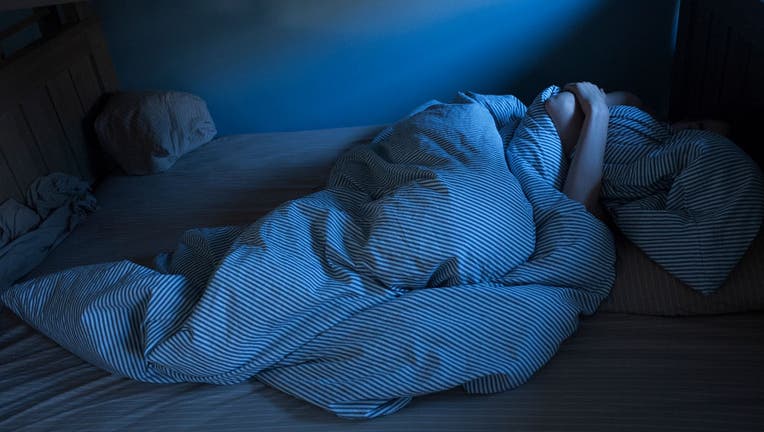Americans not getting mental health care needed amid pandemic, reports suggest

BROOKLYN, NY - JANUARY 13: A teenage boy sleeps through most of the late morning on January 13, 2018 in his home in Brooklyn, New York. (Photo by Andrew Lichtenstein/ Corbis via Getty Images)
May is Mental Health Awareness Month, and the ongoing COVID-19 pandemic has made access to mental health services more necessary than ever. Though several new reports suggest Americans aren’t getting the mental health care they need, despite data showing mental health concerns have increased during the pandemic.
For example, recent data from the U.S. Centers for Disease Control and Prevention indicated that more than 41% of adults were experiencing symptoms of an anxiety or depressive disorder in February 2021 — a significant increase from the year prior.
And now a report from Anthem, a major health insurer in the country that serves more than 106 million people, found the rate of mental health diagnoses fell flat in 2020 among its members.
The plateau of mental health diagnoses in 2020 was surprising to researchers because diagnoses had been reliably increasing since 2002 and because of the clear challenges brought on by the pandemic. This suggests Americans haven’t been seeking out mental health care during the pandemic as in years past.
Anthem analyzed healthcare claims from 27 million members in all 50 states and found that diagnoses in children dropped the most. The most common diagnosis in that age group, ADHD, dropped nearly 13% from 2019.
A drop in diagnoses in Americans 75 and older was next, with a near 12% drop in diagnoses of neurodegenerative diseases, such as Alzheimer’s, and nearly an 8% drop in dementia diagnoses.
Though the report found diagnoses in young- to middle-aged American adults did increase slightly in 2020, with anxiety and depressive disorders in the top for all age groups.
RELATED: Study: 1 in 3 COVID-19 survivors develop mental health problems within 6 months
The report suggested the drop in diagnoses was likely because of some side effects of the pandemic. Children weren’t in schools and therefore were experiencing fewer face-to-face interactions with teachers and other adults who may have identified potential mental health concerns. The drop in older adults’ diagnoses could be attributed to trouble adapting to virtual health services.
Another recent report from the U.S. Government Accountability Office found more of the same - that although evidence suggests mental health conditions have increased amid the pandemic, access to care decreased.
According to a review of federal data, one potential barrier to accessing treatment has been shortages of qualified behavioral health professionals, particularly in rural areas, the report stated.
The National Council for Behavioral Health, for example, surveyed its members and found that many organizations reduced staff and decreased services amid the pandemic. Nearly half reported their organization had to close some programs.
Additionally, two in three organizations reported to the NCBH in February 2021 that demand for their services had increased over the last three months. Nearly 70% of organizations said they had to cancel, reschedule or turn away patients.
If people aren’t getting adequate care for their mental well-being now, it can have implications on the country’s long-term mental health.
Anthem’s report also surveyed hundreds of healthcare professionals, including behavioral health specialists and primary care physicians. Nearly three out of four professionals said they expect the mental health repercussions from the pandemic will last up to three years or longer.
"Indeed, history has taught us that pandemics and other national traumatic events lead to a rise in mental health conditions, particularly rising suicide rates," the report stated, citing a 30% increase in suicide deaths in Americans 65 and older after the SARS outbreak in 2003.
RELATED: More than a third of COVID-19 survivors suffer neurological and psychiatric effects, study finds
In President Joe Biden’s proclamation on National Mental Health Awareness Month, he acknowledged how important attending to mental health has become during the pandemic.
"The COVID-19 pandemic and the resulting economic crisis has impacted the mental health of millions of Americans," he said. "Isolation, sickness, grief, job loss, food instability, and loss of routines has increased the need for mental health services. At the same time, the need to protect people from COVID-19 has made it more challenging for people to access mental health services, and harder for providers to deliver this care."
His sweeping $1.9 trillion American Rescue Plan includes expanding access to behavioral health services.
Biden said $3 billion for substance abuse and mental health care grants have been delivered, and that another $1 billion in funding has been requested to expand the number of school-based mental health professionals. Another $420 million in funding has supported behavioral health clinics.
If any bright spot is to be found in the pandemic’s toll on mental health, it can come from another aspect of Anthem’s report.
Seventy percent of the health care professionals surveyed found their patients have been more willing to "proactively bring up mental health" during appointments, which suggested people are becoming more aware of the importance of their mental well-being.

